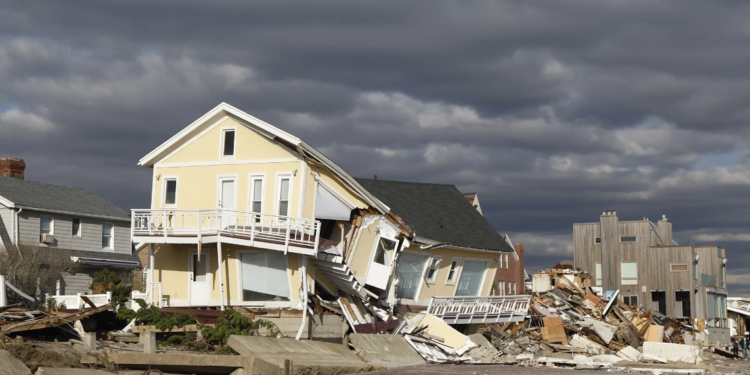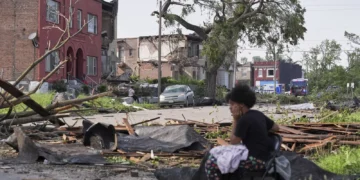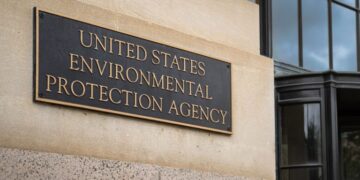Photo credit: Shutterstock
July 8, 2024 Story by: Editor
Climate change and its associated disasters present new risks to homeowners, renters, and property values but also offer opportunities for change. These challenges necessitate a reevaluation of housing policies, particularly to make traditional housing markets more effective and inclusive.
Stable and affordable housing is crucial for developing disaster-resilient communities, yet the housing sector remains an underutilized tool for helping communities better endure disasters. This is especially true in Black-majority neighborhoods, which are often more vulnerable to disaster impacts.
Housing issues often exacerbate the effects of disasters on Black communities
Black communities are disproportionately affected by disasters like floods, fires, and storms, partly due to poor-quality housing and community infrastructure. These communities often lack control over local housing decisions, increasing their vulnerability.
These neighborhoods, typically located in historically devalued areas with inadequate infrastructure, face unique challenges during disasters. Damage from floods, storms, and wildfires can severely impact homeowners’ economic security in these areas, leading to rising insurance premiums, asset damage, and reduced home equity, all of which erode family wealth. For example, homeowners in cities like Charleston face significant costs to protect their homes, such as raising foundations.
In high-risk areas like low-lying coastal plains threatened by sea-level rise, climate-related disasters undermine entire neighborhoods’ viability. This impact is sometimes worsened by city councils’ reluctance to invest in adaptations to the built environment that could mitigate disaster threats.
Additionally, housing quality can indirectly amplify disaster impacts. Poorly insulated housing increases heating and cooling costs during temperature extremes and raises healthcare costs when residents risk their health to avoid high AC bills.
Community-led solutions can help mitigate disaster impacts
Empowering residents in housing development processes can kickstart local efforts to reduce the effects of climate disasters. Initiatives like Struggle for Miami’s Affordable and Sustainable Housing (SMASH) and the Jane Place Neighborhood Sustainability Initiative (JPNSI) demonstrate how community-driven approaches can enhance housing resilience and protect vulnerable populations. SMASH, located in Miami-Dade County, uses community land trusts to give residents more control over their neighborhoods. SMASH helps residents weatherize their properties against climate extremes and collaborates with property owners and local governments to prevent evictions during disasters.
JPNSI, operating in disaster-prone areas of New Orleans, advocates for policy changes to better protect renters’ rights after disasters. By building coalitions of local Black, Latino, women, youth, and elderly residents—some of the most vulnerable groups in the city—JPNSI has successfully changed local regulations to address two major sources of insecurity before, during, and after climate-related disasters: a high number of short-term rentals and high eviction rates.
These initiatives show that community-led action, by addressing housing inequities, can reduce a community’s vulnerability to disasters.
The urgency of addressing disaster-induced housing insecurity
As temperatures rise, increasing the frequency and severity of climate-related disasters, housing insecurity will likely escalate for households and communities already experiencing precarious housing conditions. From 2019 to 2023, there were 102 separate billion-dollar climate-related disasters, averaging $122.5 billion per year. Disasters amplify displacement, highlighting the urgent need for proactive measures to safeguard housing stability.
In vulnerable places like Miami-Dade County, Florida, climate-related displacement is a major threat to Black communities. Census data shows that approximately 3.1 million adults were displaced by disasters in 2022, with 1 million from Florida due to Hurricanes Ian and Nicole. In the Miami-Fort Lauderdale-Pompano Beach metro area, 39.6% of the displaced population was Black, exceeding the area’s 19% Black population and higher than the displaced Latino (37.8%) and white (18.8%) populations.
| Source: NCEI |
Without structural reforms, disasters could worsen housing affordability issues, pushing residents out of safer areas and further marginalizing Black households. In high-elevation neighborhoods like Little Haiti in Miami, where luxury real estate development is planned, residents fear displacement. Concerns are growing about “climate gentrification,” where residents of wealthier neighborhoods, finding their areas unlivable due to climate events, buy property in less-at-risk areas, driving up costs and displacing original residents.
These challenges highlight that structural reform in the housing sector is essential for supporting residents of Black neighborhoods in strengthening their communities. By reframing housing as a vehicle for social equity, we can reduce the adverse impacts of climate-related disasters and empower marginalized communities.
Investing in community-led disaster resilience
Integrating housing reform into broader disaster preparedness strategies can build resilient neighborhoods from the ground up, preserving the integrity and vitality of Black communities. Initiatives like those led by SMASH and JPNSI, still emerging across the U.S., show the potential of structural reforms in the housing sector to reduce vulnerability to disasters, protect communities from mounting costs, and diminish the threat of disaster-related displacement. Source: Brookings

















